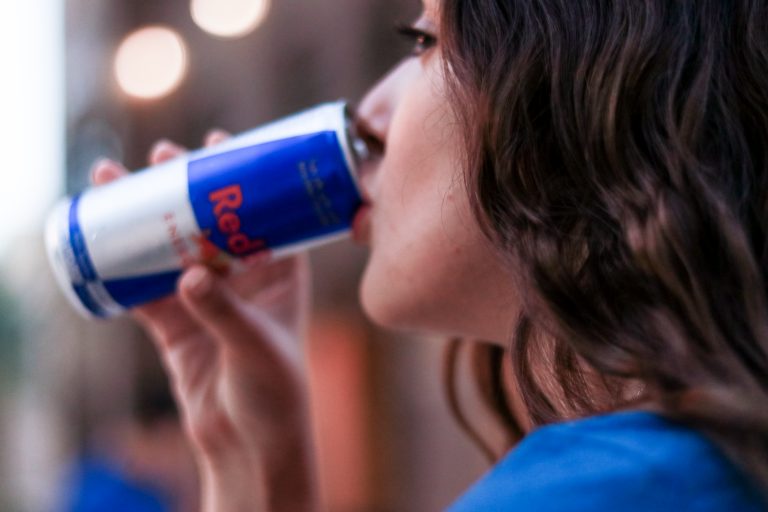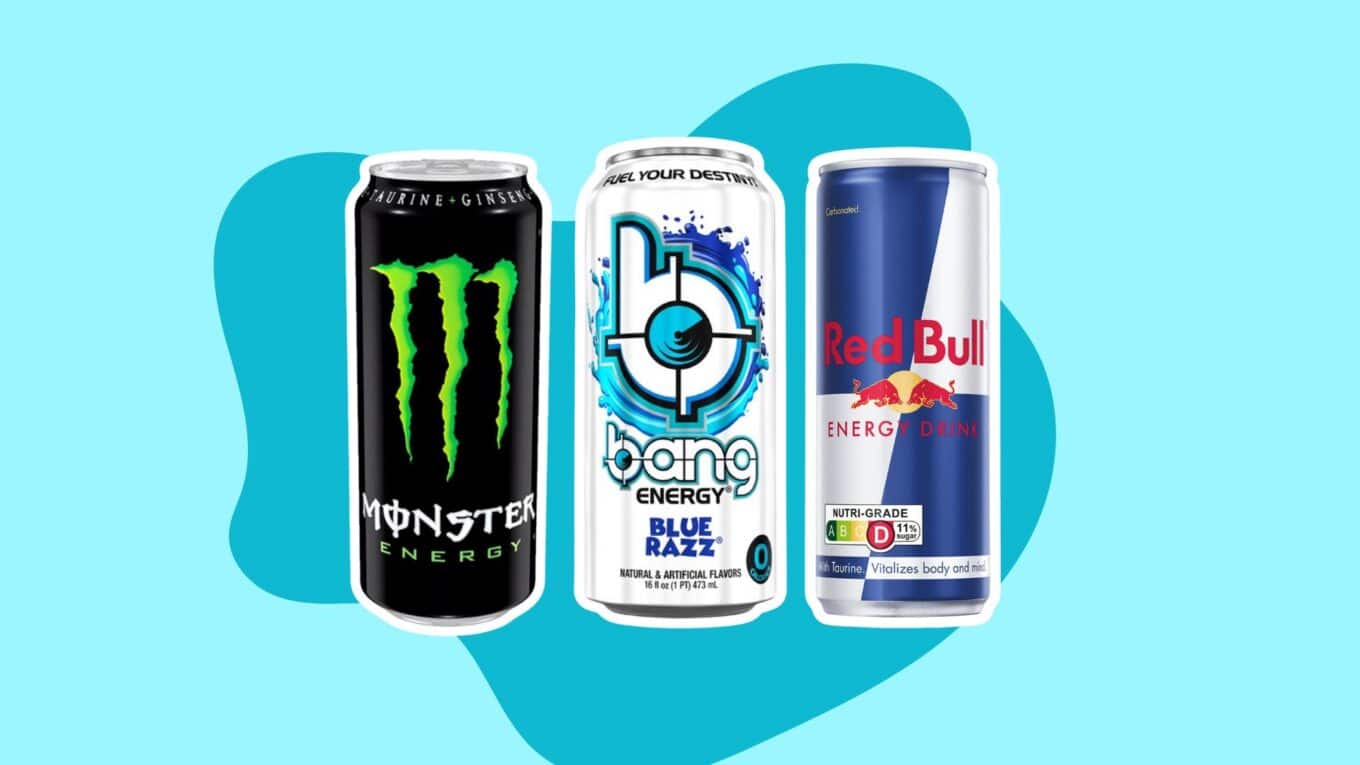Many people rely on energy drinks for a quick boost to help them through their day, whether studying for exams or pushing through a tough workout.
While these beverages may provide temporary benefits, it’s also important to understand the potential drawbacks.
In this article, we’ll explore both sides of the energy drink debate, giving you the information needed to make an informed choice about your consumption habits.
We’ll cover how energy drinks affect your body and mind, from improved alertness to possible health risks and alternative ways to increase energy levels naturally.
By the end of this comprehensive list of pros and cons, you’ll clearly understand the impact energy drinks can have on your well-being.
Benefits of Consuming the Strongest Energy Drinks

1. Immediate Energy Boost
The primary benefit of energy drinks is their quick surge of energy.
Most energy drinks contain around 80 mg of caffeine per 8-ounce serving, comparable to a cup of coffee.
This caffeine and sugar can give you the jolt needed to power through a long day at work or a late-night study session.
2. Enhanced Physical Performance
Ingredients like caffeine and taurine in energy drinks can improve physical performance.
Caffeine has been shown to increase endurance and reduce fatigue, while taurine may improve muscle contraction and reduce muscle damage.
Studies have found that athletes who consume energy drinks before events often experience improved reaction times and increased overall performance.
3. Mental Alertness
Energy drinks can also enhance mental focus and concentration.
Combining caffeine, sugar, and nootropic ingredients like ginseng can improve cognitive functions.
It makes it easier to stay alert and focused on demanding tasks.
This can be especially beneficial for professionals working long hours or students cramming for exams.
4. Convenience
Another advantage of energy drinks is their widespread availability and convenient packaging.
You can find them in most grocery stores, gas stations, and vending machines, making it easy to grab one whenever you need a quick pick-me-up.
They also come in various sizes and formats, from small shots to larger cans, so that you can choose the right amount for your needs.
5. Variety of Options
The energy drink market offers various options for different preferences and dietary needs.
In addition to regular energy drinks, sugar-free, zero-calorie, and organic alternatives are available.
These options cater to health-conscious consumers looking to reduce their sugar intake or avoid artificial ingredients without sacrificing the energy boost.
Risks Associated with Consuming the Strongest Energy Drinks

1. Health Risks
Energy drinks can pose several health risks due to their high caffeine and sugar content.
Cardiovascular Issues: Consuming large amounts of caffeine can increase heart rate and blood pressure, potentially leading to cardiovascular problems. A study published in the Journal of the American Heart Association found that energy drink consumption was associated with an increased risk of cardiovascular events in young, healthy adults.
Sugar Content: Many energy drinks contain high levels of sugar, which can contribute to obesity, type 2 diabetes, and other metabolic disorders. A single 16-ounce energy drink can contain up to 62 grams of sugar, exceeding the recommended daily intake.
Sleep Disturbances: The caffeine in energy drinks can disrupt sleep patterns and lead to insomnia. Research has shown that consuming caffeine even six hours before bedtime can reduce total sleep time by one hour.
2. Addictive Potential
The high caffeine content in energy drinks can lead to addiction and dependency.
Caffeine stimulates the central nervous system, and regular consumption can cause the body to be tolerant, requiring more caffeine to achieve the same effects.
Abruptly stopping caffeine intake can result in withdrawal symptoms such as headaches, fatigue, and irritability.
3. Negative Effects on Mental Health
Regular consumption of energy drinks can adversely affect mental health.
The combination of caffeine and other ingredients can exacerbate anxiety, induce stress, and lead to mood swings.
A study published in the journal Depression and Anxiety found that individuals who consumed energy drinks regularly were more likely to report symptoms of anxiety and depression.
4. Regulatory Concerns
Energy drinks often evade strict regulatory oversight, posing additional risks.
In many countries, energy drinks are classified as dietary supplements rather than beverages.
This means they are not subject to the same safety regulations as soft drinks.
This lack of regulation has led to concerns about the safety and labeling of energy drinks, particularly regarding caffeine content and potential interactions with other ingredients.
5. Risks Associated with Mixing with Alcohol
Mixing energy drinks with alcohol can increase health risks and impair judgment.
The caffeine in energy drinks can mask the depressant effects of alcohol, leading consumers to underestimate their level of intoxication.
This can result in increased risk-taking behavior, such as driving under the influence or engaging in unsafe sexual practices.
A study published in the Journal of Studies on Alcohol and Drugs found that individuals who mixed energy drinks with alcohol were more likely to engage in binge drinking and experience alcohol-related consequences.
Who Should Avoid Strongest Energy Drinks
Certain groups are advised to avoid energy drinks due to potential health risks.
1. Children and Teenagers
The high caffeine content in energy drinks can affect developing bodies and potentially impact behavior and concentration.
The American Academy of Pediatrics recommends that children and adolescents should not consume energy drinks due to the potential health risks associated with caffeine and other stimulants.
2. Pregnant Women
Caffeine consumption during pregnancy can pose risks to fetal development.
The American College of Obstetricians and Gynecologists advises pregnant women to limit their caffeine intake to less than 200 mg per day, less than the amount found in many energy drinks.
3. Individuals with Certain Health Conditions
People with pre-existing health conditions such as cardiovascular disease, anxiety disorders, or diabetes may experience worsened symptoms when consuming energy drinks.
The stimulants in these beverages can increase heart rate, blood pressure, and blood sugar levels, potentially exacerbating these conditions.
Safe Consumption Practices
To minimize health risks, following guidelines for consuming energy drinks responsibly is important.
1. Moderation in Consumption
Limiting energy drink intake is crucial for reducing potential adverse effects.
Health experts generally recommend consuming no more than one 16-ounce can per day.
Excessive consumption can lead to negative health outcomes, such as sleep disturbances, anxiety, and cardiovascular issues.
2. Avoid Mixing with Alcohol
Combining energy drinks with alcohol can be particularly dangerous.
The stimulating effects of caffeine can mask the depressant effects of alcohol, leading to increased alcohol consumption and a higher risk of alcohol poisoning.
This combination has been linked to increased risk-taking behavior and adverse health outcomes.
3. Awareness of Ingredients
Consumers should read labels carefully and be aware of the caffeine and other stimulants in energy drinks.
Some energy drinks may contain additional sources of caffeine, such as guarana or yerba mate, which can increase the total caffeine content.
Being mindful of these ingredients can help individuals make informed decisions about their consumption.
Alternatives to Energy Drinks

1. Natural Ways to Boost Energy
There are effective and healthier alternatives to energy drinks for increasing energy levels.
- Hydration: Proper hydration is essential for optimal bodily function and energy. Dehydration can lead to fatigue, so it’s important to drink enough water throughout the day. Start your morning with a glass of water, and consider using a hydration tracking app to ensure you’re meeting your daily fluid needs.
- Balanced Diet: Eating a balanced diet rich in fruits, vegetables, whole grains, and lean proteins can provide sustained energy throughout the day. Incorporate energy-boosting foods like bananas, apples, nuts, and whole grains into your meals. These foods contain natural sugars, fiber, and complex carbohydrates that steadily release energy.
- Regular Physical Activity: Physical activity can enhance cardiovascular health and overall energy levels. Even simple activities like walking, cycling, or practicing yoga can help boost energy without requiring a gym membership or extensive equipment. Aim for at least 30 minutes of moderate exercise most days of the week.
2. Healthy Sleep Habits
Proper sleep is crucial for maintaining good energy levels and overall health.
Health experts recommend getting 7-9 hours of quality sleep per night.
Establish a consistent bedtime routine and limit screen time before bed to improve sleep quality.
Create a comfortable sleep environment with a supportive mattress, comfortable pillows, and a cool, dark room.
3. Stress Management Techniques
Managing stress effectively can prevent energy dips and enhance well-being.
Incorporate stress reduction methods such as mindfulness meditation, deep breathing exercises, and time management skills into your daily routine.
For example, try a simple breathing exercise:
- Sit comfortably, close your eyes, and focus on your breath.
- Inhale deeply through your nose for a count of four, hold for a count of four, then exhale slowly through your mouth for a count of four.
- Repeat this process for several minutes to help calm your mind and body, reducing stress and boosting energy.
Conclusion
Energy drinks can provide a quick boost when you need them most, but weighing the pros and cons before making them a regular part of your routine is crucial.
While they can boost mental and physical performance briefly, the possible health risks like heart problems, sleep issues, and negative effects on mental health should not be overlooked.
By understanding these risks and following safe consumption practices, like moderating intake and avoiding mixing with alcohol, you can make informed decisions about your energy drink habits.
However, consider exploring natural alternatives, such as maintaining proper hydration, eating a balanced diet, exercising regularly, prioritizing sleep, and managing stress effectively.
These lifestyle changes can provide sustainable energy without the potential drawbacks of energy drinks.
Frequently Asked Questions
Is One Energy Drink a Day OK?
One energy drink per day is generally safe for healthy adults. However, limiting consumption is best to avoid potential side effects and health risks.
Are Energy Drinks Bad for Your Kidneys?
Excessive energy drink consumption, especially those high in sugar and caffeine, can put a strain on your kidneys and potentially lead to kidney damage over time.
What Are the Long-Term Side Effects of Energy Drinks?
Regular, excessive energy drink consumption may lead to long-term effects like high blood pressure, heart problems, tooth decay, kidney damage, and mental health issues.
Is Energy Drink Worse than Soda?
Energy drinks often contain more caffeine and stimulants than soda, which can lead to greater health risks when consumed excessively. However, both should be limited.
What Do Energy Drinks Do to Your Brain?
Energy drinks can temporarily improve alertness and concentration due to caffeine, but excessive consumption may lead to anxiety, irritability, and sleep disturbances, affecting brain function.




